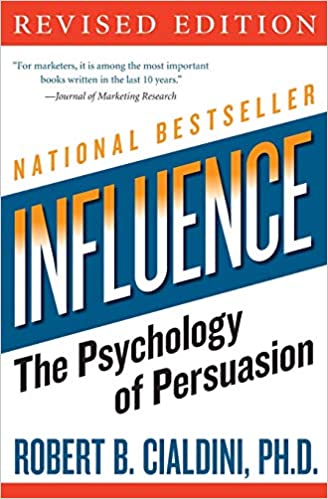We will inevitably meet someone toxic throughout our lives, which is challenging to deal with, someone who drains the energy out of us. But you don’t have to endure this type of behavior anymore.
Welcome to Snapreads! Today, we’re bringing you how to deal with toxic and difficult people. From strategies to tips and tricks, let’s get started!

Influence
by Robert Cialdini
⏱ 16 minutes reading time
🎧 Audio version available
Don’t Pretend Their Toxic Behavior is Okay
There is this strange phenomenon when dealing with toxic and difficult people that we pretend that their toxic behavior is okay. It’s either out of our pride, closeness to that person, or just not wanting to acknowledge how harmful this person really is.
It’s time to stop making excuses. It’s time to stop being compliant, even when it just seems easier to deal with them this way.
Toxic people can recognize that you prefer the path of least resistance, and they will take advantage of it. This? The short-term peace you got with going with the flow is just more pain in the future.
You’re rewarding toxic behavior when you pretend it’s okay. And that difficult person won’t change if they’re being rewarded for not changing. All that drama and negativity? It’s not worth putting up with, and there is no excuse for it.
Stop Playing Into Their Reality
You’re dealing with someone who continually sees themselves as the victim in every situation, even when they’re clearly in the wrong. When someone like this makes a mistake, the blame is immediately shifted to someone else. Or worse, they just change the story’s narrative to paint themselves in a more positive, blameless light.
Today, you’re going to stop encouraging this behavior. You’re going to stop being a supporter of this skewed reality—no more smile and nodding along in hopes of not being dragged in. When you stop supporting this narrative, this lowers the chances that this toxic person will involve you again in a similar situation.
Avoid Being Drawn into Their Web
Toxic people tend to weave a complex web, one that we get pushed and tangled into. With time, dealing with it can be exhausting and draining in your life. And that person is just benefiting from draining your energy.
This can be in the form of complaining about others, always getting into fights or arguments, and somehow still being the victim. This behavior can escalate to drawing you in and blaming you for not caring enough about their needs.
As difficult as it seems, avoiding being tangled up is achievable. The next time you’re accused of wronging them or not caring enough when you don’t indulge in their toxicity towards others, respond with a simple “sorry you feel that way” can and will go a long way.
Put Yourself First
Have you ever had a person ask you to put their needs before yours? Even indirectly? Once again, they have asked you to help them get out of a problem, asked you to vouch for them, or just plainly never thought about what you are getting out of this?
When dealing with toxicity, you’ll find yourself always giving, and they’re still taking. It can come to the point that you feel like that person’s emotional stability depends on you. Healthy relationships are a give and take. In exchange for your support, you should be getting support back.
And risking your self-worth and well-being isn’t worth it. Putting yourself first can be in the form of limiting your contact with that person, blocking that person, or just avoiding them altogether. What’s important is you.
Say “No” More
Saying “no” feels like an uphill battle, one that drags you down and breaks out into outbursts when you refuse them, but that’s the trick to dealing with difficult people.
It’s saying a firm “no,” and cementing your refusal to deal with their drama by walking away. Everyone has problems walking away and turning people down, especially when dealing with master manipulators who continually try to guilt-trip you into revoking that refusal.
The more you practice telling that person “no,” the easier it is to stick to that decision. And the more they’ll stop expecting you to go along with their plans.
When more drama awaits when you stop indulging them, that’s when walking away and removing yourself from the situation comes in.
Become Unavailable To Them
You’re not someone who is going to roll over anymore. When it comes to toxic people, they’re probably used to getting what they want, and they have been employing the same methods throughout their lives. That means they can sense who they can manipulate and who won’t fall for it.
When their manipulation stops working on you, that may be the trigger to them moving on. Now that you’re unavailable to those toxic people, ignoring their attempts at communication, they will eventually get the hint and stop trying to engage.
This works especially if you’re dealing with a difficult person at work. There are a plethora of genuine excuses you can use. For example, too much work to chat is a sure way to get out of any rant. The first few times, you may get some remarks, a little passive aggression, or dramatic bursts at your unavailability, but that person will move on.
Speak Up for Yourself
Is the path of least resistance not working out anymore? Sometimes, that person needs reality, and that is to be told that their behavior is unacceptable.
These master manipulators are used to getting what they want– whether that’s by using force, psychology tactics, or just plain guilt tricks. And this is the last time you’ll tolerate this.
Behavior toxic people employ, behavior that upsets you, includes constantly interrupting you, downplaying your accomplishments, speaking negatively about something you care about, or downright sabotaging you.
Once that person knows that they’re doing something wrong, they can back down once confronted.
That’s the thing here. When people keep quiet, that toxic person thinks it’s okay to continue behaving as they do. Until one person speaks up, they may not even be aware that they’re doing anything wrong.
The reaction you’ll get may be surprised, anger, or even outrage, but it’s essential to speak up nonetheless. Otherwise, you’ll get sucked back into their toxic games.
Speaking up using a direct statement can be quite disarming. And if they try gaslighting you into believing that they’re not in the wrong, spell it out again. If they continue down the path of denial, at least you have acknowledged how harmful this attitude is. You have stopped being a tool for them to manipulate.
Don’t Try to Fix Them
What is it about toxic people that invokes the need to fix them? If that person is a parent, a sibling, or a close friend, we may try to fix them regardless of how much they can hurt us. Here, the course of action is to just offer compassion to them but do not attempt to fix them.
This is if you don’t block that person from your life. Offering them compassion isn’t the least you can do; it’s the most.
That person can change, but they’re either unwilling to put in the work or just don’t want to. And that’s on them, not you. And putting in the effort on their behalf will only drain your emotional reservoirs.
Don’t Take It Personally
The most important thing to know when dealing with a problematic person is understanding that the problem is with them, not you. There is nothing personal with their toxicity.
Toxic people will try to flip the script around, guilt-tripping you into thinking that somehow, you’re the one in the wrong. And because you’re a good person, you may unintentionally fall for this. But believing that it’s your fault will eventually negatively affect your self-esteem, hurt your confidence, and change your outlook on life. Don’t stand for that anymore.
Once you stop taking their behavior personally, you’ll notice the weight off your shoulders, the freedom that comes along with ridding yourself of that burden. And you’ll have a new perspective. You may even start to notice that this isn’t exclusive to you. The chances are that this person uses the same manipulation tactics with everyone they come into contact with.
Even if your interactions felt personal, all the toxicity from your relationship with that person comes solely from them and their own problems and insecurities.
Sometimes, it comes down to this: you have to move on without that person.
If this person insists on constantly negatively affecting your life, your self-esteem, and your well-being, it’s time to move on from them.
If they didn’t back away no matter how much you have pointed out how harmful their behavior is, no matter how much you tried to limit contact with them, then it’s best to contact them entirely severely.
Does this sound like a person you need in your life?
What Is Snapreads?

With the Snapreads app, you get the key insights from the best nonfiction books in minutes, not hours or days. Our experts transform these books into quick, memorable, easy-to-understand insights you can read when you have the time or listen to them on the go.
